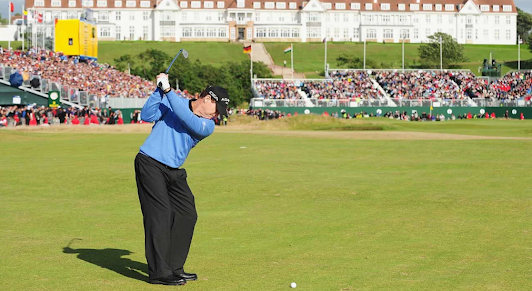British Open : Defying age and winning. As the tournament returns after a 2020 cancellation, a look at its past, present and future.
The British Open seems to be a fountain of youth for older players.
From the 18th fairway in the final group of the British Open in 2009, Tom Watson, the five-time Open champion, hit a shot that flew right at the pin. For a moment, it looked like Watson, then age 59, would win the tournament for a record sixth time and become the oldest player to win a major championship.
A firm bounce set the ball off the back of the green, and Watson needed three more shots to get the ball into the hole. That drooped him into a tie for the first, In the flour-hole playoff, he ran out of gas and lost by six shots.
A decade ago, the idea of an older golfer contending in, let alone winning, a major championship was something few considered. That was still the time when most golfers petered out in their mid-40s and licked around the golf world before having a brief resurgence on the Champion Tour when they turned 50.
The man who beat Watson that day, Stewart Cink, is now part of a group of professional golfers defying age and expectation to contend and win tournaments and majors. Cink, 48, has won twice this season on the PGA Tour, his first win since on the PGA Tour, first win since the 2009 Open.
Leading these middle-age mavericks is Phili Mickelson, who, about to turn 51, won the P.G.A, Championship in May. He beat Brooks Koepka, a four-time major winner, and Louis oosthuizen , the 2010 British Open champion, who are both in their 30s.
At last month's United States Open, Richard Bland, 48, of England, became the oldest person to ever lead that tournament at the halfway mark. He had also been the oldest first-time winner on the European tour, when he won the BetfredBritish Masters in May.
''All these guys have taken a new approach,'' said Dave Phillips, a cofounder of the Tirleist Performance Institute, which focuses on golf and fitness.
''There's a lot of money out there. They realize they can still compete with the younger guys, but they need to spend more time on their body and what they fuel their body with.''
Phillips said what Micelson and the others were doing provided lessons for older golfers. ''It's not strength, but the recovery and the downtime that matter,'' he said. ''Its letting your body recover. Everyone wants to get fitter, stronger, faster. They're upset when they don't see the results. But what they're doing is fatiguing to the body more so than a round of golf.''
It is experience, for sure, but that is a double-edged sword : With age, players are more knowledgeable about the nuances of the game and have, in theory, a better psychological understanding of what to. But they have also failed to do that in similar moments in the past.
'' The reason we're going longer is we have the financial security to go longer,'' he said. ''We also have the sport science to reinvent ourselves.''
If ever there was an annual fountain of youth, it is the British Open. ''The Open is the best of all tournaments for the older guys,'' Harrington said. ''It's more about experience. There's less physicality on an Open course than a typical stadium course. That's why Tom Watson could compete at 59 years old at the Open.''
As for Cink, he said facing Watson, who is two decades his senior, in the playoff was actually calming. ''As a fan I was consumed thinking look at Watson go, but then I realized I was in contention,'' Cink said.
''The playoff almost felt like an out-of-body experience. I would have been sweating bullets, but having Watson involved kept me calm.''
The World Students Society thanks author Paul Sullivan.

.png)


0 comments:
Post a Comment
Grace A Comment!